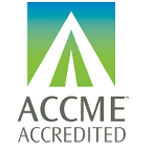Continuing Medical Education
Accreditation Statement

The American Association for Cancer Research (AACR) is accredited by the Accreditation Council for Continuing Medical Education (ACCME) to provide continuing medical education activities for physicians.
Credit Designation Statement
AACR has designated this live activity for a maximum of 13.75 AMA PRA Category 1 Credit(s)™. Physicians should only claim credit commensurate with the extent of their participation in the activity.
Credit certification for individual sessions may vary, dependent upon compliance with the ACCME Accreditation Criteria. The final number of credits may vary from the maximum number indicated above.
Claiming (CME) Credit
Physicians and other health care professionals seeking AMA PRA Category 1 Credit(s)TM for this live continuing medical education activity must complete the online CME Request for Credit Survey by April 21, 2025. Certificates will only be issued to those who complete the survey. Your CME certificate will be sent to you via email after the completion of the activity.
Successful completion of this CME activity, which includes participation in the evaluation component, enables the participant to earn up to 13.75 Medical Knowledge MOC points in the American Board of Internal Medicine’s (ABIM) Maintenance of Certification (MOC) program. Participants will earn MOC points equivalent to the amount of CME credits claimed for the activity. It is the CME activity provider’s responsibility to submit participant completion information to ACCME for the purpose of granting ABIM MOC credit.
To receive ABIM MOC, participants must request MOC in the CME Request for Credit Survey and complete all questions. Once these steps are completed, AACR will submit your completion information via the ACCME’s Program and Activity Reporting System for the purpose of granting MOC points.
Statement of Educational Need, Target Audience, and Learning Objectives
This conference serves as a crucial forum for advancing research and improving outcomes in acute lymphoblastic leukemia (ALL), a disease with significant unmet needs, particularly in relapsed or refractory cases. With rapid progress in areas such as CAR-T cell therapy, stem cell transplantation, and molecularly targeted therapies, the event will focus on how to effectively integrate these innovations into standard care.
Sessions will explore both B-cell ALL (B-ALL) and T-cell ALL (T-ALL) biology, highlighting the role of cutting-edge diagnostics like genomic profiling and minimal residual disease (MRD) monitoring in personalizing treatment. Discussions will also emphasize the growing importance of immunotherapies in frontline treatment.
As the landscape of ALL therapy evolves, ongoing clinical trials and emerging modalities will be discussed to shape the future of treatment.
The upcoming conference on Acute Lymphoblastic Leukemia (ALL) aims to bridge the gap between scientific research and clinical practice, offering invaluable insights for both scientists and clinicians. Plenary sessions will delve into key areas such as cellular therapies, B-ALL and T-ALL biology, and molecularly targeted therapies, fostering a comprehensive understanding of the disease’s complexities. Discussions on targeted immunotherapies and advancements in diagnostics and prognostics will equip attendees with the latest tools for improving patient outcomes. By exploring future directions in ALL therapy, the conference will encourage collaboration and innovation, ultimately driving progress in treatment strategies. This event promises to serve as a critical platform for sharing knowledge, fostering partnerships, and shaping the future landscape of ALL care.
The conference will address key gaps in acute lymphoblastic leukemia (ALL) research and clinical practice, focusing on the optimal integration of novel therapies like CAR-T and molecularly targeted treatments into standard care. It will bridge understanding between B-cell ALL (B-ALL) and T-cell ALL (T-ALL), explore the personalization of treatment through genomic profiling and minimal residual disease (MRD) monitoring, and clarify the role of immunotherapies in frontline settings. Additionally, discussions will focus on preventing relapse and improving long-term outcomes, translating research into clinical practice, and addressing disparities in access to advanced treatments. By tackling these challenges, the conference aims to foster collaboration and accelerate advancements in ALL therapy.
This educational activity is developed for scientists, researchers and clinicians from across academia and industry involved in studying, treating and understanding Acute Lymphoblastic Leukemia.
After participating in this CME activity, physicians should be able to:
- Formulate treatment plans with combining standard protocols with molecularly targeted therapies.
- Distinguish the subtypes of ALL.
- Articulate the accessibility and equity of ALL care.
- Identify new approaches to diagnose and treat ALL early.
- Demonstrate the necessity of personalized medicine in ALL.
Disclosure Statement
It is the policy of the AACR that the information presented at AACR CME activities will be unbiased and based on scientific evidence. To help participants make judgments about the presence of bias, AACR will provide information that Scientific Program Committee members and speakers have disclosed all financial relationships they have with ineligible companies whose primary business is producing, marketing, selling, re-selling, or distributing healthcare products or services used by or on patients. All of the relevant financial relationships for these individuals have been mitigated.
Planner and Speaker Financial Disclosure Index Available Soon
Questions about CME?
Please read our frequently asked questions. If you still have questions, contact the Office of CME at (215) 440-9300 or [email protected].
